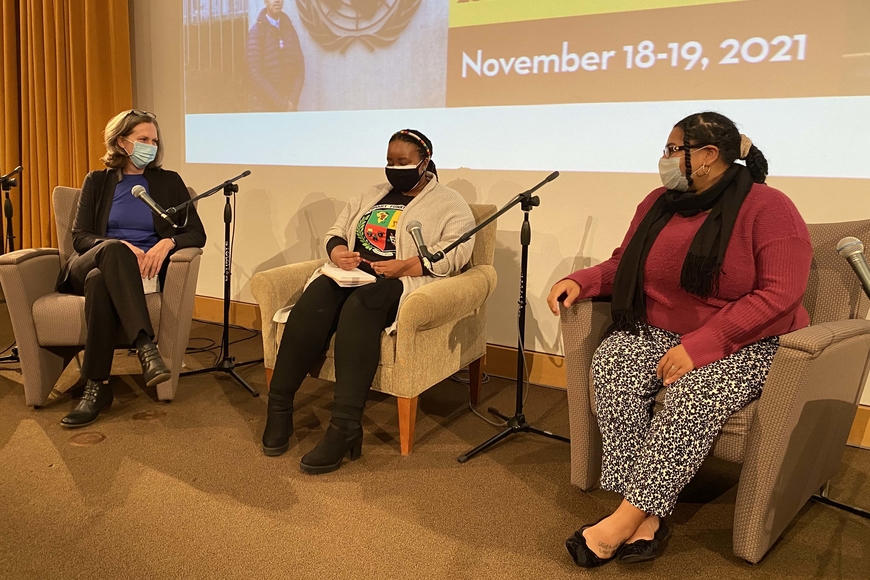Protection Networks for The Black Liberation Movement
Master of Human Rights alumni Ta’Mara Hill (MHR ‘21) and Nonkululeko (Nkuli) Shongwe (MHR ‘21) presented their research on protection networks for Black liberation activists at the Human Rights Program 20th Anniversary Symposium on November 19, 2021. The researchers, who began their work following the murder of George Floyd and subsequent racial justice protests in the summer of 2020, interviewed 11 Black activists and community organizers across the U.S. between July 2020 and January 2021. In May 2021, they submitted their findings in a memo to the Office of the United Nations High Commissioner for Human Rights.
Shongwe, who works as a program manager for Nexus Community Partners, described the researchers’ initial tasks as they approached the project in July 2020. The goal of the research, Shongwe said, was to determine whether the work of Black liberation activists “in any way, shape, or form afforded them any protections, and in what way the U.N. could be helpful in delivering protection networks.”
Hill, a policy advocate at the Center for Victims of Torture, described the pair’s methodology. The researchers first identified a diverse array of Black Human Rights Defenders working on issues related to racial justice, including police reform, reproductive rights, climate change, and Holistic Black liberation. After separating their duties by geography, the researchers conducted interviews on the activists’ daily work, personal security, access to protection networks, and view of U.S. and international institutions. While the activists came from a variety of demographic and political backgrounds, Hill said, “the one thing that everyone had in common was the belief in Black liberation.”
Hill and Shongwe found that the Human Rights Defenders interviewed in their project face routine and grave threats to their personal security. The most common dangers identified by interviewees include mental trauma, threats of physical violence, and hacking and other cyber security risks. Shongwe noted that Black activism is especially traumatic because the work is deeply personal and intimately connected to activists’ racial identities. The risks are constant, she said, “because you never stop being Black.” She added, “there’s no place for Black people to run away to,” because anti-Black racism is universal. The researchers concluded that Black Human Rights Defenders enjoy little access to vital protection networks and often are unable to take steps to minimize risks to their image and person.
Interviewees in Hill and Shongwe’s research also expressed deep disillusionment with U.S. and international human rights institutions. While activists desire to receive help from intergovernmental organizations, they see the groups as ineffectual at challenging powerful political actors. “The U.N. holds this great international power,” said Hill, “but it feels to them [Black liberation activists] that the U.N. isn’t willing to use that power and use the voice that they have against actors like the United States.”
Hill and Shongwe shared the activists’ discontent with the state of the international human rights community. While the researchers submitted their work to OHCHR as input on the Human Rights Council’s historic Resolution 43/1, the two expressed doubt that their project would significantly affect Black Human Rights Defenders’ access to protection networks. Hill was frank about her concerns: “How much did we traumatize people and ourselves in comparison to how much we succeeded?”
While Hill and Shongwe expressed doubts over the efficacy of their research, the pair also emphasized their project’s critical role in an emerging discourse around human rights violations inside the United States. Hill, who works with U.S. human rights at the Center for Victims of Torture, argued that domestic and international human rights issues are inseparable. “Human rights exist here at home, too,” added Shongwe. “Just go out the door and we can figure out how we can do human rights work.”



